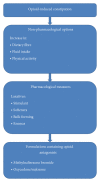Opioid-induced constipation: pathophysiology, clinical consequences, and management
- PMID: 24883055
- PMCID: PMC4027019
- DOI: 10.1155/2014/141737
Opioid-induced constipation: pathophysiology, clinical consequences, and management
Abstract
Although opioids offer potent analgesia for severe acute and chronic noncancer pain, adverse gastrointestinal effects potentially undermine their clinical utility. In particular, between 40% and 95% of patients develop opioid-induced constipation (OIC). Therefore, there is a consensus that patients should commence laxatives at the start of opioid therapy and continue throughout treatment. Nevertheless, laxatives are not routinely coprescribed with opioids. Even when concurrent laxatives are prescribed, approximately half the patients treated for OIC do not achieve the desired improvement. Moreover, laxatives do not target the underlying cause of OIC (opioid binding to the μ -receptors in the enteric system) and as such are not very effective at managing OIC. The failure of lifestyle modification and laxatives to treat adequately many cases of OIC led to the concurrent use of peripherally acting opioid antagonists (such as methylnaltrexone bromide and naloxone) to reduce the incidence of gastrointestinal adverse events without compromising analgesia. Judicious use of the various options to manage OIC should allow more patients to benefit from opioid analgesia. Therefore, this paper reviews the causes, consequences, and management of OIC to help clinicians optimise opioid analgesia.
Figures
Similar articles
-
Treatment of opioid-induced constipation: focus on the peripheral μ-opioid receptor antagonist methylnaltrexone.Drugs. 2013 Aug;73(12):1297-306. doi: 10.1007/s40265-013-0084-5. Drugs. 2013. PMID: 23881667 Review.
-
Peripherally acting μ-opioid receptor antagonists as treatment options for constipation in noncancer pain patients on chronic opioid therapy.Patient Prefer Adherence. 2017 Jan 17;11:107-119. doi: 10.2147/PPA.S78042. eCollection 2017. Patient Prefer Adherence. 2017. PMID: 28176913 Free PMC article. Review.
-
Management of opioid-induced constipation.Br J Nurs. 2016 May 26-Jun 8;25(10):S4-5, S8-11. doi: 10.12968/bjon.2016.25.10.S4. Br J Nurs. 2016. PMID: 27231750 Review.
-
Methylnaltrexone bromide for the treatment of opioid-induced constipation.Expert Opin Pharmacother. 2018 Jul;19(10):1127-1135. doi: 10.1080/14656566.2018.1491549. Epub 2018 Jul 6. Expert Opin Pharmacother. 2018. PMID: 29979903 Review.
-
Opioid-induced constipation.Scand J Gastroenterol. 2015;50(11):1331-8. doi: 10.3109/00365521.2015.1054423. Epub 2015 Jun 10. Scand J Gastroenterol. 2015. PMID: 26061717 Review.
Cited by
-
Declining Rates of Referral for Irritable Bowel Syndrome Without Constipation at a Tertiary Care Center.Dig Dis Sci. 2019 Jan;64(1):182-188. doi: 10.1007/s10620-018-5302-2. Epub 2018 Oct 15. Dig Dis Sci. 2019. PMID: 30324554
-
The influence of brain metastases on the central nervous system effects of methylnaltrexone: a post hoc analysis of 3 randomized, double-blind studies.Support Care Cancer. 2021 Sep;29(9):5209-5218. doi: 10.1007/s00520-021-06070-7. Epub 2021 Feb 25. Support Care Cancer. 2021. PMID: 33629189 Free PMC article. Clinical Trial.
-
Acupuncture for opioid-induced constipation: Protocol for a systematic review and meta-analysis.Medicine (Baltimore). 2020 Dec 4;99(49):e23352. doi: 10.1097/MD.0000000000023352. Medicine (Baltimore). 2020. PMID: 33285714 Free PMC article.
-
[Incidence of constipation in patients with outpatient opioid therapy].Schmerz. 2016 Apr;30(2):158-65. doi: 10.1007/s00482-015-0018-0. Schmerz. 2016. PMID: 26115741 German.
-
Opioid-induced Constipation: A Review of Health-related Quality of Life, Patient Burden, Practical Clinical Considerations, and the Impact of Peripherally Acting μ-Opioid Receptor Antagonists.Clin J Pain. 2020 Sep;36(9):716-722. doi: 10.1097/AJP.0000000000000852. Clin J Pain. 2020. PMID: 32554978 Free PMC article. Review.
References
-
- Casati A, Sedefov R, Pfeiffer-Gerschel T. Misuse of medicines in the European Union: a systematic review of the literature. European Addiction Research. 2012;18:228–245. - PubMed
-
- Alexander G, Kruszewski SP, Webster DW. Rethinking opioid prescribing to protect patient safety and public health. Journal of the American Medical Association. 2012;308:1865–1866. - PubMed
-
- NICE. Opioids in Palliative Care: Safe and Effective Prescribing of Strong Opioids for Pain in Palliative Care of Adults Clinical Guideline 140. London, UK: NICE; 2012.
-
- Longstreth GF, Thompson WG, Chey WD, Houghton LA, Mearin F, Spiller RC. Functional Bowel Disorders. Gastroenterology. 2006;130(5):1480–1491. - PubMed
-
- Ueberall MA, Müller-Lissner S, Buschmann-Kramm C, Bosse B. The bowel function index for evaluating constipation in pain patients: definition of a reference range for a non- constipated population of pain patients. Journal of International Medical Research. 2011;39(1):41–50. - PubMed
Publication types
LinkOut - more resources
Full Text Sources
Other Literature Sources
Medical
Research Materials


